Road to March 7, 1971
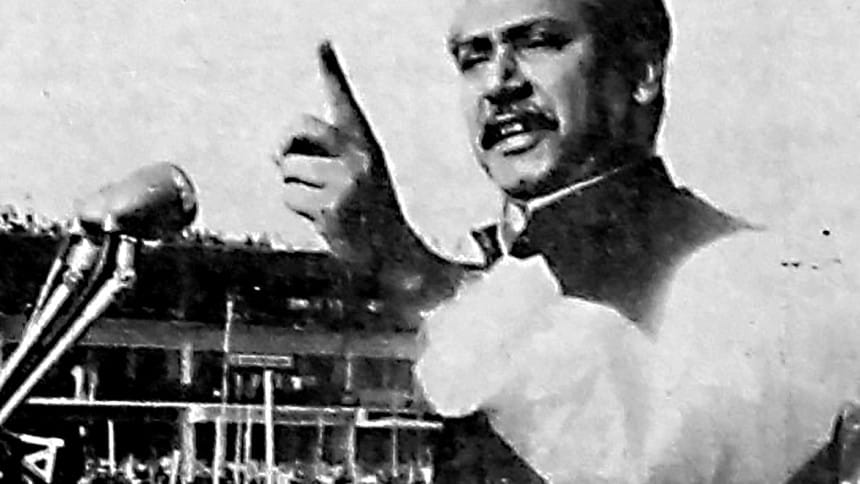
Bangladesh is a country built on a foundation of struggle. The struggle for language, as our people sacrificed their lives to have our mother tongue be our state language in 1952. The struggle of poverty, famine, natural disasters, and of course, the struggle for freedom. Through it all, the relentless spirit of the Bangalees could never be suppressed.
The Pakistani general elections held on December 7, 1970 led to a landslide victory for Awami League (AL) under the leadership of Bangabandhu Sheikh Mujibur Rahman. AL won 167 seats out of 169 constituencies of East Pakistan out of a total of 300 seats in the National Parliament of Pakistan. The elections were held under a Legal Framework Order (LFO), which called for the drafting of a constitution of Pakistan within 120 days of forming the parliament. Bhutto refused to follow the 120-day time period, and wanted President Yahya Khan to postpone the session of the National Assembly. The days that followed became the most crucial time leading up to Bangabandhu's historic March 7 speech.
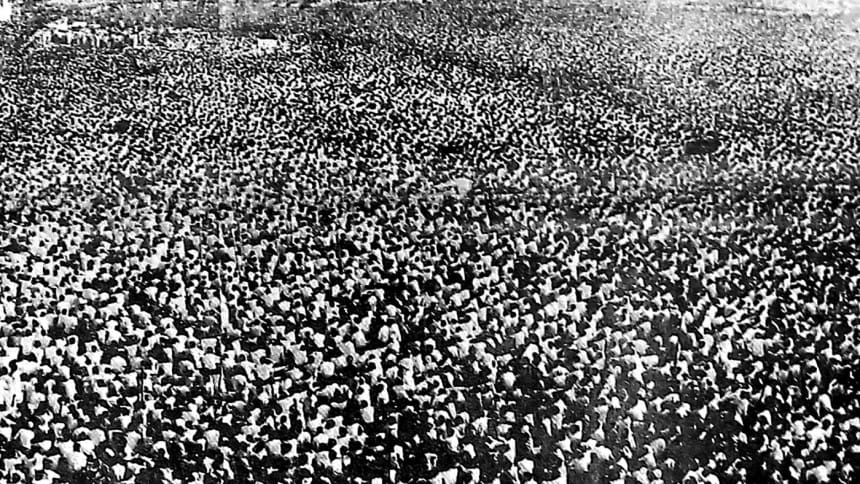
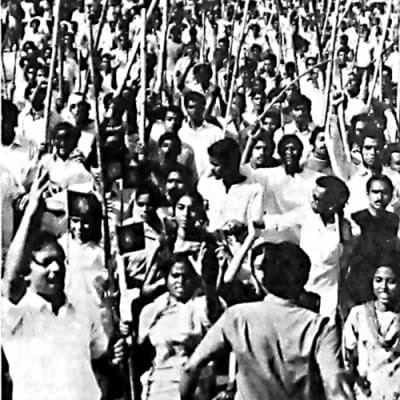
March 3, 1971
All hell broke loose in East Pakistan, as President Yahya Khan had declared the postponement of the National Assembly session, which was to be held on this day. As the majority party of a democratic system, AL should have been allowed to form the government of Pakistan. They were denied this right in one of the most discriminatory acts to have gone down in history. The day before, an all-party meeting was held in AL office, excluding PPP, to discuss the latest political situation. The parties criticised Bhutto for his stand, and called for the National Assembly session to be held within five days. Strikes from 6 am to 2 pm every day till March 6 were announced, in protest. Bangabandhu, however, asked everyone to maintain peace throughout all protests. Processions flooded into Paltan Maidan to join a rally addressed by Bangabandhu. He announced the manifesto of the new independent nation, declared our national anthem for the very first time, and called for the Non-Cooperation Movement in protest of West Pakistan's unfairness. He even added that the people of East Pakistan will no longer pay taxes until AL is handed over power. He said, "The people of Bengal pay rent and taxes to run the state, not to get shot." West Pakistan imposed a curfew to try to calm down the protests, but nobody could dim the fiery rage of the Bangalees who had been wronged one too many times.
March 4, 1971
Bangabandhu refused General Yahya Khan's invitation to a meeting of political leaders on March 10, by calling it a "cruel joke." A pivotal decision was made to rename "Radio Pakistan" as "Dhaka Betar," which changed the game for Bengal's media. Officers and employees of all radio centres in Dhaka had taken this decision collectively, and now the radio station broadcasted directives by AL, alongside patriotic songs by Kazi Nazrul Islam and Rabindranath Tagore. The agenda for the day included the strike from 6 am to 2 pm, with a procession and gayebi janaza scheduled for 12 pm. Bangabandhu had his people's best interest in mind, and so urged the offices to remain open for the next two days to allow employees to collect their salaries, but still called for strikes on the fifth and sixth of the month. The Non-Cooperation Movement announced by Bangabandhu was in full swing. Gunfights, arson, and clashes with armed forces in Chattogram and Khulna on March 3 and 4 had led to the death of over 121 people. Bangabandhu addressed the public to remind them that the freedom of a nation can never be won without immense sacrifice, and congratulated everyone on the progress of the rebellion. He stood beside the injured and called on everyone to donate blood to the blood banks. Air Marshal (Retired) Asghar Khan demanded that power be handed over to AL to save Pakistan from separation. He said in a press conference at Karachi Press Club, "The country has reached the verge of disaster."
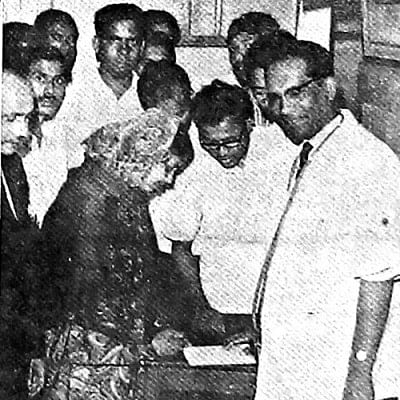
March 5, 1971
The strike continued, with Chhatra League and Dhaka University Central Students' Union (DUCSU) visiting every masjid and mandir to hold special prayers, praying for the success of the Non-Cooperation Movement. In Tongi, four labourers were shot dead, while 25 were injured. This news triggered a mourning procession by Chhatra League. Air Marshal (Retired) Asghar Khan reached Dhaka at night to meet with Bangabandhu in his Dhanmondi residence. There were rumours all around that President Yahya Khan was in Dhaka, but he was actually in Rawalpindi's Presidential Palace, speaking to Bhutto for over five hours. There were additional rumours that Bangabandhu had contacted the United States of America or other foreign powers to help fight the oppression happening in East Pakistan by creating pressure on West Pakistan; he publicly denied this accusation. The numbers of dead and injured at Chattogram Medical College Hospital were still on the rise, as clashes continued. West Pakistan was still adamant in its plans of not holding the National Assembly session. However, President Yahya Khan's central government was quickly losing control over East Pakistan, apart from inside the cantonments. President Yahya Khan's reaction to East Pakistan gaining more and more power was to send General Tikka Khan, known as the "Butcher of Baluchistan," to Dhaka, and swear him in as the Governor of Pakistan. They were ready to attack during any opportunity. However, Chief Justice B. A. Siddiky refused to swear him in, under Bangabandhu's orders. The Bangalees were ready to fight back, if necessary.
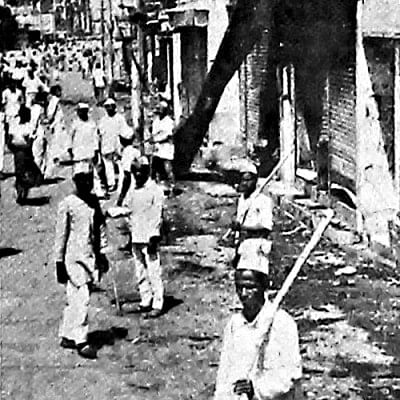
March 6, 1971
News broke out in all forms of media of the mass rally to be held on March 7 at Race Course Maidan (now called Suhrawardy Udyan), where Bangabandhu was supposed to deliver a speech. Things began to heat up as the people of East Pakistan speculated whether Bangabandhu will finally declare independence. President Yahya Khan and West Pakistan armed forces speculated the same, and were eager to arrest Bangabandhu as soon as he made a proclamation of independence, on grounds of him being a secessionist. Strike was still being observed peacefully, as the fifth day of the Non-Cooperation Movement rolled in. At around 11 am, however, 321 prisoners tried to escape the central jail; seven of them were shot dead, while 30 were injured. President Yahya Khan then announced something unexpected – the National Assembly would be in session on March 25, 1971. He also added that, as long as he was the President and in command of the Pakistan military, the solidarity of Pakistan would remain unchallenged. PPP's Bhutto supported his words. This was nothing less than a threat to East Pakistan, and the blood of the Bangalees continued to boil – almost to the point of spilling over. People in Narayanganj and Dhaka started processions right after the radio broadcast, as they were especially angered by the fact that President Yahya Khan had criticised the role of Bangabandhu, and blamed East Pakistan for the state of the country. AL's working committee called an emergency meeting with Bangabandhu to discuss the new date of the National Assembly session, and the fate of East Pakistan. All depended on the rally speech to be held the next day.
The pressure on the East Pakistan leader was intense. Tension and anticipation were in the air of March 7, 1971. All that had happened in the Non-Cooperation Movement in the past few days led up to this one afternoon. The fate of millions rested in the words of one heroic leader, as he stood in front of a huge crowd at Race Course Maidan, at 2:45 pm. Bangalees were eagerly waiting for a declaration of independence, while armed forces were waiting to fire on them the minute the proclamation was uttered. Bangabandhu Sheikh Mujibur Rahman had a lot to consider before he began to deliver the greatest speech in the history of Bangladesh.

 For all latest news, follow The Daily Star's Google News channel.
For all latest news, follow The Daily Star's Google News channel. 



Comments